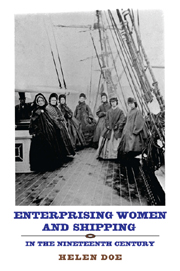Book contents
- Frontmatter
- Contents
- List of Tables and Figures
- List of Illustrations
- Dedication
- Acknowledgements
- Abbreviations
- Introduction
- 1 The Legal, Financial and Cultural Environment
- 2 Maritime Communities
- 3 Five Investor Ports
- 4 Shipowning Wives, Widows and Spinsters
- 5 Active and Passive Female Shipowners
- 6 Managing Owners
- 7 Port Businesswomen
- 8 Warship Builders
- 9 Merchant Shipbuilders
- 10 Conclusion: ‘A Respectable and Desirable Thing’
- Appendices
3 - Five Investor Ports
Published online by Cambridge University Press: 12 September 2012
- Frontmatter
- Contents
- List of Tables and Figures
- List of Illustrations
- Dedication
- Acknowledgements
- Abbreviations
- Introduction
- 1 The Legal, Financial and Cultural Environment
- 2 Maritime Communities
- 3 Five Investor Ports
- 4 Shipowning Wives, Widows and Spinsters
- 5 Active and Passive Female Shipowners
- 6 Managing Owners
- 7 Port Businesswomen
- 8 Warship Builders
- 9 Merchant Shipbuilders
- 10 Conclusion: ‘A Respectable and Desirable Thing’
- Appendices
Summary
Much of the attention given to women investors has been in relation to investments in joint stock companies. There were increasing opportunities to invest in joint stock companies and the arrival of limited liability in the 1850s reduced the risks for investors. What has not been considered is the evidence relating to the substantial number of women who invested in shipping particularly through the 64th system of shipownership. This chapter provides the background to the shipowning system and to the five ports from which most of the investment data have been gathered.
Shipping had been an investment for centuries and women shipowners were a constant factor, long before the rush to invest in canals, railways, banks and limited companies. As seen earlier the important distinction between investment in a company and shipping investment was the jurisdiction of maritime law, which provided wider opportunities and freedom for investors. It also gave them a direct relationship with their investment; they were not just investors but shipowners. The investor, male or female, acquired shares in a vessel through purchase or inheritance and some or all of the shares might be sold or further purchases made. Under maritime law, shares could be bought, sold, bequeathed, gifted or mortgaged without reference to the other shareholders. In joint stock companies large numbers of investors diluted the power of the minority shareholder and the main decisions were made by the directors.
- Type
- Chapter
- Information
- Publisher: Boydell & BrewerPrint publication year: 2009



